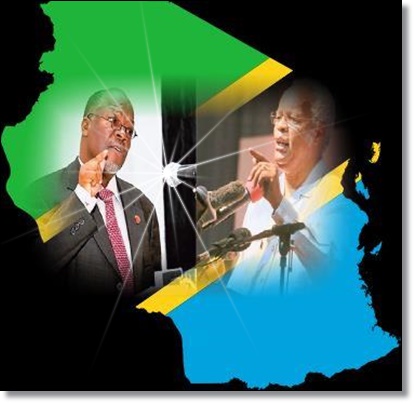October Elections in Canada and Tanzania: Lessons for Zambian Politics
 |
| Leading presidential candidates in Tanzania |
Machiavelli stated a long time ago that in politics, the end justifies the means, that politicians will do anything to win victory including electoral victory. Machiavellian politics as a concept derives from Machiavelli's total unethical praxis of politics. Anything goes, including corruption. Earlier, Plato had stated that man is a political animal. This means that human beings will translate every interaction into a political transaction. Aristotle had this view: politics is the art of the possible, meaning politicians will try to find a way to make the impossible or improbable, possible.
In Canada and Tanzania, the ruling parties promised to deliver impossible goods that they were never able to deliver despite their years in power, just to win another election. One may ask, why didn't they deliver on those goodies all those years of power. Why were they campaigning as if they are members of the opposition? Secondly the ruling parties in Canada and Tanzania started raining some goods on the electorate during the campaign stretch, goodies that they withheld during their long reign in power. Just to win another election. What is left behind is a train-wretch of debt. This is a burden obviously of the next government or same government if it retains power. The new promises and manna from heaven given by ruling parties and campaigning that if the old ruling parties are voted out of power, the people will not see any new development, smacks of corruption, extortion, electoral fraud and is negative. Fair electioneering that is not too excessive and fraudulent and without treating the electorate as stupid is reasonable. In Canada, the electorate would not be fooled by the ruling party. The ruling party lost power.
I was in Tanzania in August 2015 and I observed the electorate flock to opposition campaign rallies that rivalled those of the ruling party, a party that has been ruling since 1963. The ruling party had never been challenged like that before. The ruling party promised everything to retain power except to make God visible to the human eye. Whether the ruling party will succeed to hoodwink the electorate once again will be known during the week of October 26, 2015.
The opposition complained that the ruling party had turned the Tanzania Police into a political instrument of governance where the police targeted and harassed opposition politicians. This negative trait is not practised in Canada at all. Is this trait alleged in Zambia? In a constitutional democracy, turning the police into a political and partial instrument for a ruling party would be justiciable. This topic is for another column.
A lot of positive developments were visible in the elections of October 2015 in Tanzania and Canada. In the most, candidates stuck to the issues and rarely if ever, especially in Canada sunk to the level of personal attacks. It is also commendable that tribalism, racism and other divisive isms never reared their ugly heads. One of the most endearing traits of Tanzania is the fact that tribalism has almost been overcome or suppressed. I lived in Tanzania and I saw the happiness that enveloped the people of Tanzania because of the freedom from tribalism and other oppressive primordial ties. People still invoke these nation -destroyers but not as much as they are invoked in countries like Nigeria, Kenya or Zambia. In Canada, racism during electoral campaigns is never prevalent or invoked as a scare tactic. There is a positive lesson for Zambia. Stick to the issues that matter most and issues that build the nation under the immortal slogan of One Zambia, One Nation. Or is that slogan mortalized now?
In Tanzania, the opposition realized that to have a chance at electoral victory, the opposition must form a coalition. The ruling party had been winning since 1992 when multi-party politics were allowed because among other reasons, the opposition was split. Kenya is also a perfect example of how the repressive and unpopular Arap Moi regime managed to rule all those years because the opposition was split. The US has only two parties and they alternate at intervals of about 8 years. What is the state of the opposition in Zambia? The ruling party has not been in power for a long time. Is there exhaustion of the party by the population? Can the opposition dislodge the ruling party without unity in the opposition? Has the ruling party delivered on its promises? Is the opposition offering a sustainable alternative? In Canada the opposition answered in the affirmative and won on October 19th, 2015. In Tanzania, the United opposition will answer the question during the week of October 26th, 2015. In Zambia and the US, it will be in 2016.
In modern politics including Canada, debates between presidential candidates is a positive practice of politics. In Canada and the US, a presidential candidate can conceivably never win the presidency without participating in numerous debates with other aspiring candidates. Is this a practice in Zambia or can leaders abdicate from this barometer of political maturity and accountability without consequences? One of the greatest experiences of politics in the US, Kenya, UK, Australia and Canada is observing how our leaders perform under pressure. When a leader is elected, you already have an idea or experience about their capabilities. Zambia should emulate this positive character in politics. Politics after all, is the art of the possible.
By Munyonzwe Hamalengwa, PhD
Dr. Munyonzwe Hamalengwa is the author of Class Struggles in Zambia and the Fall of Kenneth Kaunda as well as Thoughts are Free: Prison Experience and Reflections on Law and Politics in General. He is an international consultant on social justice after having practised law in Canada for twenty five years.
